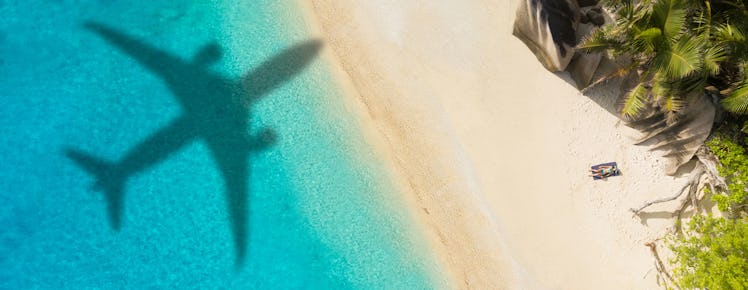
Experts Explain Why You Should Rethink Your Summer Travel Plans
Amid stay-at-home orders and continued social distancing due to the coronavirus pandemic, your daily life probably looks a lot different than it normally would ,and the disruptions are likely to continue into the summer. If you've got travel plans on the horizon, you're probably wondering if it's safe to fly this summer. Here's what experts have to say about jetting off on a vacation.
Memorial Day weekend, aka the unofficial start of summer, is coming up on Friday, May 22, but with over 1.18 million confirmed cases of COVID-19, the illness caused by the novel coronavirus, in the United States as of Tuesday, May 5, it might not be the best time to hop on a flight. As of Friday, May 1, the Center for Diseases Control and Prevention (CDC) recommends travelers stay at home as much as your schedule allows, especially if your trip is non-essential.
The CDC's recommendation is a great place to start when thinking about summer travel, and experts agree staying home is the safest move. Dr. John Swartzberg, M.D., F.A.C.P., clinical professor of infectious diseases and vaccinology at UC Berkeley School of Public Health, tells Elite Daily, "As long as the virus is circulating widely in the [United States], there is no safe time to fly." Swartzberg emphasizes the flight itself isn't the only thing you should think about when considering travel. He adds, "The airports are also risky places, not just the plane."
Though states and regions have begun to re-open for business, Dr. Rachel Vreeman, M.D., M.S., director of the Arnhold Institute for Global Health at the Icahn School of Medicine at Mount Sinai, tells Elite Daily that travelers should not view this as a "green-light for traveling as normal." Vreeman says, "Much to everyone’s regret, we all should really consider our summer travel plans suspended."
Vreeman says optimal conditions for leisure travel will require widely-available COVID-19 testing, and a vaccine for the novel coronavirus, which doesn't seem to be coming in the immediate future. "It is going to take weeks, if not months, to know whether the COVID-19 virus remains quieted down enough after these re-openings for any activities to carry on safely," she explains. "If you have trips booked for which you could still get any sort of refund, I would advise canceling those plans now."
According to Swartzberg, the novel coronavirus is still spreading rapidly, and the majority of Americans are still at risk of infection. He adds, "Even though young people are less likely to get sick and die than older people, or people with other risk factors, they can spread the virus to those groups." To prevent new outbreaks, Swartzberg also emphasizes the need for more COVID-19 testing, as well as a vaccine.
In the instance that you do, however, need to travel by airplane this summer — and the restrictions allow you to do so — Vreeman tells travelers that they should wear a face mask, wash their hands, use hand sanitizer as often as possible, and maintain at least six feet of distance from other people. As of May 4, some airlines are requiring passengers to wear face masks in order to board flights.
In addition, Swartzberg recommends wiping down everything you touch when you get on the plane, trying not to use the bathroom, not walking in the aisles, and sitting next to the window to minimize contact with other flyers.
Though no travel method is entirely free of risk, there are safer options to consider if you still want to take a vacation by car this summer. "Travel options that would allow you to be 'quarantined' in a place or able to maintain good distance from others are likely the safest," Vreeman says. However, she warns that these alternative options still pose a risk of spreading the novel coronavirus: "If you carry the virus with you, more rural locations may not have the health care facilities that you would need if you get sick. And, you might be putting others at risk if you bring COVID-19 into a new community." Swartzberg says if you must travel, the best option is a road trip that doesn't require an overnight stay, and he adds that you should also avoid dining out and public transportation on such a trip.
As summer approaches, Vreeman recommends travelers to keep an eye on the evolving situation and follow the CDC recommendations for travel. Though changing or canceling your summer vacations last minute may be stressful, following the guidelines for travel can help prevent the spread of the virus. If you're not sure you can keep yourself and others safe during summer travel, according to Swartzberg, "The safest thing to do is to stay home."
If you think you’re showing symptoms of coronavirus, which include fever, shortness of breath, and cough, call your doctor before going to get tested. If you’re anxious about the virus’s spread in your community, visit the CDC for up-to-date information and resources, or seek out mental health support. You can find all Elite Daily's coverage of coronavirus here.
Experts cited:
Dr. Rachel Vreeman, M.D., M.S., appointed chair of Global Health and director of the Arnhold Institute for Global Health at the Icahn School of Medicine at Mount Sinai
Dr. John Swartzberg, M.D., F.A.C.P., clinical professor emeritus at the UC Berkeley School of Public Health's Division of Infectious Diseases and Vaccinology